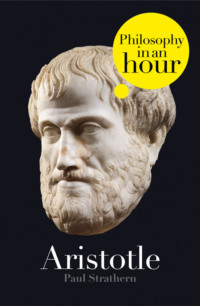Книгу нельзя скачать файлом, но можно читать в нашем приложении или онлайн на сайте.
Читать книгу: «Aristotle: Philosophy in an Hour»

Aristotle
PHILOSOPHY IN AN HOUR
Paul Strathern

Contents
Cover
Title Page
Introduction
Aristotle’s Life and Works
Afterword
Further Information
From Aristotle’s Writings
Chronology of Significant Philosophical Dates
Chronology of Aristotle’s Life
Chronology of Aristotle’s Era
Recommended Reading
A Note on the Author
Copyright
About the Publisher
Introduction
Aristotle was perhaps the first and the greatest of all polymaths. He is known to have written on everything from the shape of seashells to sterility, from speculations on the nature of the soul to meteorology, poetry and art, and even the interpretation of dreams. He is said to have transformed every field of knowledge that he touched (apart from mathematics, where Plato and Platonic thought remained supreme). Above all, Aristotle is credited with the founding of logic.
When Aristotle first divided human knowledge into separate categories, this enabled our understanding of the world to develop in a systematic fashion. But in recent centuries our knowledge expanded to the point where it was being seriously hindered by this categorisation. Such systems of thought allowed knowledge to develop only along certain predetermined paths, many of which were in danger of petering out. A radically different approach was needed. The result is the modern world of science.
The fact that it took us over twenty centuries to discover these limitations in Aristotle’s thought only demonstrates his unparalleled originality. Yet even the demise of Aristotelian thought has given rise to many fascinating philosophical questions. How many more of these limitations have we yet to discover? How dangerous are these flaws in our way of thinking? And exactly what are they preventing us from learning?
Aristotle’s Life and Works
On a promontory above the village of Stagira, in northern Greece, stands a rather uninspired modern statue of Aristotle. Its expressionless face gazes out over the lumpy wooded hills toward the distant blue Aegean. Aristotle’s pristine white marble form, almost luminescent in the brilliant sunlight, wears a décolleté toga and sandals, bearing a slightly chipped scroll in its left hand. (This damage is said to be the work of a souvenir-hunting Argentinean philosophy professor.) Carved into the plinth in Greek are the words ‘Aristotle the Stagirite’.
Aristotle was born at Stagira, but despite the statue he wasn’t born in the modern village of Stagira. According to the guide book he was born in nearby ancient Stagira, whose ruins are still visible. After my disappointing encounter with the statue, I set off to find the ruins. These were somewhere just down the road, I was told by a young Batman returning home from school. With a flourish of his black plastic cloak, he indicated the road to the coast.
After an hour’s sweltering walk down the long winding road, with the thunder rumbling ominously around the rocky hills above me, I was eventually given a lift to Stratoni, an eerie combination of deserted seaside resort and mining village. Ancient Stagira lay somewhere off the old road a bit farther to the north, I was told by a carpenter who was repairing the closed café on the empty waterfront.
Few cars travel on this road in October, as I was soon to discover. And the autumn storms in this region, when they eventually break, can be severe. For an hour I sheltered beneath a narrow ledge of rock as the torrential downpour cascaded over the bare hillside with no sign of ruins or vehicles visible in the flickering, crashing gloom around me. Soaked to the skin, I raged to myself about the statue of Aristotle which had led me to Stagira, the wrong Stagira. It was nothing more than a fraud. The modern village of Stagira had no claim whatsoever to be known as Aristotle’s birthplace, apart from fortuitously sharing the same name. Why, by the same token they might just as well erect a statue of Joan of Arc in New Orleans …
Aristotle was born in 384 B.C. at ancient Stagira in Greek Macedonia. In the fourth century B.C. Macedonia was regarded by the ancient Greeks in much the same way as the modern French regard Britain and America. But Stagira was not beyond the pale of civilization. This was a small Greek colony founded by the Aegean island of Andros.
Aristotle’s father Nicomachus had been personal physician to Amyntas, the king of Macedon and grandfather of Alexander the Great. As a result of this connection, which had ripened into friendship, Aristotle’s father seems to have become a rich man, acquiring estates around Stagira and elsewhere in Greece. The young Aristotle was brought up in an atmosphere of medical learning, but his father died when he was still young. Aristotle was then taken to Atarneus, a Greek city on the coast of Asia Minor, where he was brought up by his cousin Proxenus.
Бесплатный фрагмент закончился.
Начислим
+4
Покупайте книги и получайте бонусы в Литрес, Читай-городе и Буквоеде.
Участвовать в бонусной программе
